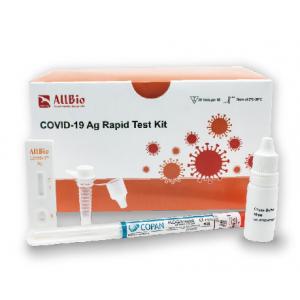

Add to Cart
The Novel Coronavirus SARS-Cov-2 Antigen Rapid Test Cassette (Swab) is an in vitro diagnostic test for the qualitative detection of novel coronavirus antigens in Nasopharyngeal swab, using the rapid immunochromatographic method. The identification is based on the monoclonal antibodies specific for the novel coronavirus antigen. It will provide information for clinical doctors to prescribe correct medications.
Product Parameters:
| Catalogue Number | PCR001F |
| Detecting | ORF1ab, N gene, E gene, Inner Control |
| Sample Type | Oral swab/Nasal swab |
| Storage | -20°C |
| Shelf-ife | 12 months |
| Reaction Volume | 20uL |
| Aplicable instruments | PCR machines with at least 4 fluorescent channels |
| Name | Item | Spec. | |
| PCR amplification kit | PCR Buffer | 960μl ×1 Tube | Primer, probe, dNTP |
| PCR Mix | 48μl×1 Tube | DNA polymerase, reverse transcriptase | |
| Contrast reagents | Negative control | 400μl×1 Tube | cell-culture medium |
| Positive control | 400μl×1 Tube | Pseudovirus with target gene fragment |
INTEND USE
The rapid test kit is used for qualitative determination of novel coronavirus (SARS-CcV-2) antigen in human nasal swab samples in vitro.. This kit is offered to clinical laboratories and healthcare workers for point-of-care testing, and not for at home testing, in compliance with Section IV.D. of the FDA’s Policy for COVID-19 Diagnostic Test.
MAIN COMPONENTS
• Test Cassette.
• Extraction Tube.
• Extraction Reagent.
• Nasal/Oral Swab.
• Working Holder.
HOW TO PERFORM THE TEST?
1. Remove a Test Device from the foil pouch by tearing at the notch and place it on a level surface.
2. Holding Extraction Reagent bottle vertically, add 10 drops (400μL) to the Extraction tube.
3. Insert the nasopharyngeal (and oropharyngeal) swab sample(s) into the extraction solution, then, mix the swab 10 times.
4. Remove the swabs while pressing against the solution tube in order to extract most of the specimen
5. Place the dropper cap and drop 3 drops (60~70μl) into the sample well.
6. Read the result in 10-15 minutes. Do not read results after more than 20 minutes.
Something you need to learn about:
1) What is the difference between an antigen test and a molecular
test?
An antigen test detects specific proteins on the surface of the
virus. These tests are quicker and less expensive, but have a
higher chance of missing an active infection, according to the FDA.
A molecular (PCR or polymerase chain reaction) test detects the
virus’s genetic material. These tests require a more complex
technology to get results, and it usually takes a day or two to get
those results (depending on lab capacity, results may take up to a
week).
If an antigen test shows a negative result and you have reason to
believe you may have the virus (because of symptoms or exposure),
your doctor may order a molecular test to confirm the results.
2) Which tests are more accurate?
No test is 100% accurate, but the molecular tests are considered to
be more accurate than the antigen tests, according to available
research.
According to the FDA, an antigen test cannot “definitively rule out
active coronavirus infection,” but positive results are “highly
accurate” (negative results may require a confirmation test).
Harvard Medical School wrote in August that the reported rate of
false negatives with molecular testing is as low as 2% and as high
as 37%. A molecular test using a deep nasal swab will have fewer
false negative results than samples from throat swabs or saliva,
they say.
For antigen testing, Harvard noted that the reported rate of false
negative results can be as high as 50%, but that the FDA has
granted emergency use authorization for a more accurate antigen
test.
In general, some of the issues that may affect the accuracy of a
test include ineffective swabbing, contamination or mishandling of
the sample, or problems with the testing chemicals, according to
the FDA.
3) If antigen tests are less accurate, why would we use them?
Experts say the value in the rapid antigen tests is in the
frequency of the testing rather than the accuracy, with repeated
testing recommended. According to Science, getting a false negative
in an antigen test two or three times in a row is rare. This
strategy lines up with the NPR report mentioned above, which would
employ daily testing of those in high-risk areas.
4) Who must be tested for COVID-19?
As per the Minister’s Directive: COVID-19: Long-Term Care Home
Surveillance Testing and Access to Homes (Minister’s Directive)
effective January 8, 2021, all staff, student placement and
volunteers working in long-term care homes must be tested regularly
in accordance with the Minister’s Directive, unless the exception
for individuals who have previously had laboratory confirmed
COVID-19 applies. The testing requirements in the Minister’s
Directive include all individuals working in long-term care homes
who are: • Staff as defined in the Long-Term Care Homes Act, 2007 •
Volunteers as defined in the Long-Term Care Homes Act, 2007 •
Student placement, meaning any person working in the long-term care
home as part of a clinical placement requirement of an educational
program of a college or university, and who does not meet the
definition of “staff” or “volunteer” under the Long-Term Care Homes
Act, 2007. The Minister’s Directive also includes additional
testing and documentation requirements for general visitors,
caregivers and support workers.
